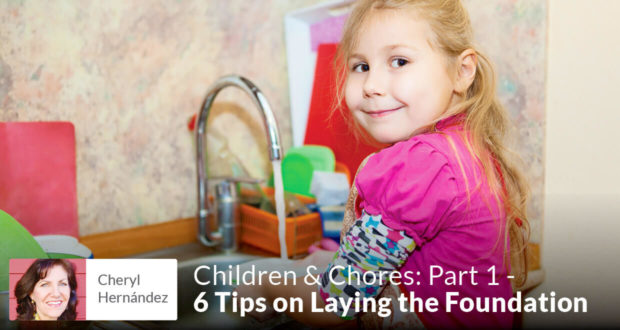Summary
Cheryl Hernandez, Homeschool mom of nine, shows how chores provide the perfect opportunity to instill and teach responsibility, obedience and other virtues.1. Why should my children do chores?
Let me count the ways!
More importantly than just helping around the house, chores teach responsibility, stewardship, diligence, obedience, order, and self-discipline. These virtues will also carry over into their schoolwork, music lessons, athletics, or any other endeavor they take on.
Homeschooling provides the perfect opportunity to instill these virtues by teaching our children to work.
Having the responsibility of completing daily chores also builds true “self-esteem”, because children are treated as valuable and integral members of the family… and they are learning important skills for life. When they are older and can cook an entire meal and set a beautiful table, or build a bonfire after cutting down a tree and chopping up the wood by themselves — that’s self-esteem building.
Properly training our children to do chores frees up our time considerably, so we can be more efficient with homeschooling or other areas of home management, enjoy more time with our family and better yet, spend more time in prayer and Adoration.
Convinced? Then let’s explore how to teach our children.
2. When do I start teaching them?
While they are still in diapers! The same muscles that are used to dump the blocks out of the box are used to put them back into the box. Put a little basket in the corner of the playpen and have the baby put her toys away before she gets out. Make up and sing a lively pick-up song as you help her, and she’ll think it’s just another game.
A one-year old can put her diaper in the garbage and dirty laundry in the hamper. A two-year old can pick up his room if there is a set place for everything. Start them off with good habits, and they won’t develop bad habits.
Think about when you are teaching a preschooler to write his letters and you stand over him, watching to make sure he is forming each letter correctly. We want good habits established early — the same applies to working. Train, don’t retrain!
3. Lower your standards but raise your expectations
“Lower your standards” means that the house doesn’t need to be perfect. We are homeschooling parents with extraordinarily busy, demanding lives. Keep the house clean, tidy and organized, but recognize there is more to life than perfectly dusted baseboards.
Our chief desire should be to instill the value of hard work (and even a love for work) in our children. This means we have to set aside our propensity for perfection or to do all the work ourselves. Especially when teaching young children, we have to be patient and allow our children to work alongside us, concentrating more on their effort than on the quality of the job.
“Raise your expectations” means that kids can do much more than we usually give them the opportunity to do — or think they can do. I discovered this years ago when the older kids went away to camp during the summer. After the first day, I immediately noticed how much work they actually do. Then I started looking around for younger kids to help out.
That’s when I realized the younger ones really are capable of doing so much more, and rise to the challenge. They actually get excited to take on the “big kid” chores when their older siblings are away.
When all of our nine children lived at home, I attended my niece’s wedding. For four days, with my husband working during the day, the kids ran the household, including making dinners, laundry, cleaning, taking care of a two-year old and making sure they were ready for soccer practice or piano lessons when my husband came home.
Don’t be afraid to raise your expectations, and then give your children the opportunity to meet them!
4. Minimize the chores
Simplify your life, your possessions, your home.
Put a basket next to the front and back doors so the kids take off their shoes when they go inside. We live in the country with dirt everywhere so this really makes a difference in keeping the floors clean. One of my daughter’s chores is to empty the shoe baskets and put the shoes in their proper closets each day.
Everyone clears their own dishes — putting them in the dishwasher or throwing away paper plates. Each can have a water cup with their name on it sitting on the counter that they use throughout the day rather than using a clean cup every time they need a sip of water.
Teach your kids to wipe down the sink with a paper towel after brushing their teeth or washing their face.
Everyone puts their own laundry away.
Minimize toys in rooms — especially in the living room. Kids don’t need dozens of toys and they certainly don’t need them in the common living areas! Other than for a crawling baby, we have never allowed toy baskets in the living room — just book baskets (two children per book basket). Because of this, they naturally gravitate toward reading when they have free time. Each is in charge of organizing their own book basket and returning finished books to the book shelves.
We keep all the books in our home in one room on book shelves – keeping them visible and accessible to all. My 16-year old daughter is our home librarian and in charge of maintaining the book shelves.
One very important way to minimize chores…
5. Teach the kids to pick up after themselves
Young children can learn not to begin another activity until they have picked up their last one. If this is not taught, kids will jump from one activity to another, leaving piles of toys along the way. For example, if a two-year old is playing with his cars, he cannot sit down and play with puzzles until he has picked up his cars.
Teach this over and over and very soon he will automatically do this by himself without being reminded.
An interesting thing happens when children are expected to pick up before beginning another activity: they will stick with it longer, exploring the toy more deeply or actually completing a craft they have begun. It sounds strange, but their playtime then becomes less superficial and they become more genuinely interested in the activity or toy. They will get “bored” far less often.
There are exceptions, such as when your son is in the middle of a 100-piece puzzle, or your daughter has her doll toys all set up in a corner and wants to continue playing later. Privilege is granted when a child shows responsibility.
When our children were young and would leave toys (soccer cleats, jackets, school books) around, I just picked them up and put them in a separate basket up high in a closet. No yelling or getting upset. I charged 25¢ per item. If my child didn’t have any money, he had to do an extra chore to work for the money.
Believe it or not, if you are consistent, you will not get rich from this — kids will learn very quickly it is expensive to be messy.
6. Everything has a proper place
Another wonderful thing to teach children (and to practice it ourselves) is to put things back where they belong. It sounds simple, but how many times do we waste time searching for that stapler that is not where it should be – or trip over the vacuum which was left on the top of the stairs.
Start teaching children this very early. I cannot emphasize enough how much easier it is in the long run when we train properly from the beginning, compared to attempting to retrain a child when he has become used to being disorderly. Train, don’t retrain!
Initially, it takes time to train young children. You have to stop everything, bring the child over to where he threw the jacket on the floor, and watch as he properly hangs it on the hook. When he kicks his shoes off and they end up in the middle of the back porch, call him over and watch as he has to put them neatly in the shoe basket (or in his room closet).
Consistency on your part, and beginning from an early age to teach this, will most likely result in an orderly child. Very young children actually love to have a set place for everything.
Orderliness learned in the small things when the child is young will carry over to orderliness in his school work and more effective time management when he is older. An added benefit is that his good example, as he grows up and your family expands, will trickle down to the younger siblings – making your job that much easier!
In Children & Chores, Part 2: Organizing work, we will explore the efficiency of written chore charts, working together as a team, logical consequences, and finally, the joy of learning to work together as a family.

 Seton Magazine Catholic Homeschool Articles, Advice & Resources
Seton Magazine Catholic Homeschool Articles, Advice & Resources

